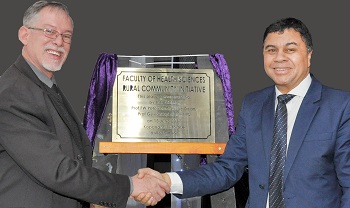Latest News Archive
Please select Category, Year, and then Month to display items
12 October 2020
|
Story Dr Cindé Greyling
|
Photo Supplied
 Exercise and nutrition can work wonders for your mental health – you don’t even have to ‘feel like’ or ‘enjoy’ moving around and eating well for it to work – it does its thing anyway.
Exercise and nutrition can work wonders for your mental health – you don’t even have to ‘feel like’ or ‘enjoy’ moving around and eating well for it to work – it does its thing anyway.
Nowadays, people talk about mental health like it is the common cold – which is good! But do you know what it really means? Being mentally healthy does not only refer to the absence of a mental illness but includes your emotional and social well-being. One would almost want to add physical well-being too, since a healthy body does indeed support a healthy mind. However, since so many people consider themselves ‘mental health experts’, some myths have been sold as truths.
Myth #1 – You are doomed.
Nope. Never. You are never doomed. There is always help. Mental-health therapies range from self-help, talk therapy, medication, to hospitalisation in some cases. Somewhere on this spectrum of treatments, there will be something that works for you. But you must be willing to get the help and do the work. For starters, exercise and nutrition can work wonders – you do not even have to ‘feel like’ or ‘enjoy’ moving around and eating well for it to work – it does its thing anyway.
Myth #2 – It won’t affect you.
It may. Research suggests that one in five people may suffer from a mental illness at some point in their lives. Being well now does not mean that it will stay that way. Biological and environmental factors both impact your mental health. Hopefully not, but at some point, you may experience an event that affects your mental health.
To remain integrated in a community is always beneficial
for anyone suffering from a mental or physical condition.
Myth #3 – Someone struggling with mental health must be left alone.
Hardly! To remain integrated in a community is always beneficial for anyone suffering from a mental or physical condition. You do not need to fix them, but to remain a friend. Continue to invite them, even if they decline. Do not judge, and do not try to understand. Just stay around.
Go and be kind to yourself, and to those around you.
UFS Faculty of Health Sciences opens student residence in Trompsburg
2017-07-06

Official unveiling of the memorial plaque by
Prof Gert van Zyl, Dean of the Faculty of Health Sciences,
and Prof Francis Petersen, Rector and Vice-Chancellor
of the University of the Free State.
Photo: Charl Devenish
The University of the Free State’s (UFS) Faculty of Health Sciences has, as part of its commitment to student and community development, established a student residence in the town of Trompsburg in the Kopanong Local Municipality. The faculty officially opened the Rural Community Initiative and student residence in June 2017. The newly developed student residence has 10 apartments which could each accommodate six individuals. A housemaster resides on the premises and acts as manager of the facility. All areas of the residence are Wi-Fi covered and it has a 24-hour security service.
Importance of the residence
The goal of the Kopanang le fodise – Unite to heal programme is to develop a community-centred collaborative framework for sustainable, holistic healthcare and social development which is incorporated in the curricula of the faculty. During 2016, a total of 324 fourth-year students have each spent at least a week in primary healthcare facilities on a Community Based Education and Inter-Professional Education platform in Trompsburg and Springfontein in the Kopanong Municipality.
“This programme was commissioned to fulfil a specific goal. We are connecting our students with the community. The support of everyone coming together caused this to move from being just a spark, to a blaze. This is all our project,” said Dr René Botha, coordinator for Community-based Education and Rural Health in the faculty.
Community outreach a priority
“This is an innovative project that has been able to bring health and health-related issues to the community. One of the UFS’ three focus areas is community engagement. This project is primarily focused on serving the community, but also on the academic element, which is student development,” said Prof Francis Petersen, Rector and Vice-Chancellor of the UFS.
Prof Petersen commended the project on being the first of its kind in the South African Health Sciences sector. The platform will also be used for research purposes that will enrich the sector. Prof Petersen challenged the Kopanong community to give their input by answering two questions: What is the UFS good at? What is the UFS good for?
Reaching for the stars
“I am a dreamer and I have to reach, and if I reach, I reach for the stars. Today we are very lucky, because we have grabbed that star,” said Prof Gert van Zyl, Dean of the UFS Faculty of Health Sciences.
Prof Van Zyl reminded the audience that they possess the power to change challenges into stars by approaching them with careful thought, planning, and motivation. Prof Van Zyl concluded by stating that the rural community initiative is for the community, and that the faculty is just the facilitators.